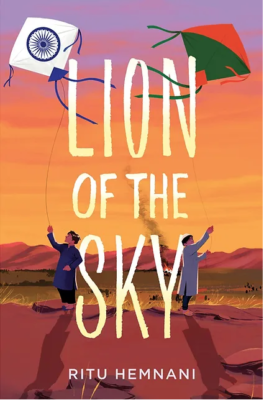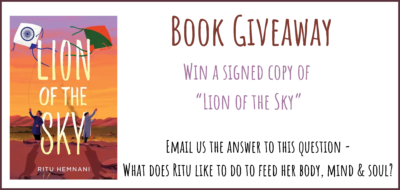
Ritu Hemnani’s journey with middle-grade novels starts with LION OF THE SKY, an immersive, heartwarming, vivid and moving verse novel. A historical tale about a boy and his family who are forced to flee their home after the Partition of India is more than another refugee story. The book is a journey and a lesson in finding courage, embracing uncertainty and finding joy in life despite suffering devastating losses.
We speak to the KidLit author about her new book which makes its debut at the Hong Kong International Literary Festival this March.
Ritu, your first book, Gope and Meera, also a story based around the Partition of India, took you to classrooms and to thousands of children around the world. Now, with LION OF THE SKY, you’ve added another book to Partition literature. Why is the history of Partition still so relevant for kids to learn about today?
The history of Partition is still so relevant for kids to learn today because by learning about the experiences of individuals and communities affected by Partition, children can develop empathy and a sense of compassion for those who have endured such hardships. The legacy of division and communal tensions that resulted from Partition is echoed today in conflicts around the world, where deep-seated ethnic, religious, or territorial divisions contribute to ongoing conflicts and struggles for power. Understanding these connections helps kids reflect on the importance of conflict resolution, peace-building, and the promotion of inclusive societies to prevent the repetition of past tragedies and strive for a more harmonious future.
LION OF THE SKY deals with many difficult themes, such as migration, displacement, loss and fear. How do you approach such subjects when you speak to children?
In my middle-grade novel, I tackle themes like migration, displacement, loss, and fear in a sensitive and age-appropriate way. I depict characters who experience these challenges and highlight their resilience and ability to overcome adversity. When speaking to children, I never shy away from acknowledging the reality of violence and upheaval, but I am intentional about using language and imagery that young people can understand. I also encourage open discussions, promote empathy, and offer hope and reassurance through the characters’ growth and positive outcomes.
Your novel puts a spotlight on the impact of war on children and the loss of their childhood. Could you speak a little about this?
In my middle-grade novel, I depict how war quickly exposes children to frightening situations, forces them to distance themselves from lifelong friends due to differences in religion, and makes them witness the darker aspects of the world. I balance these realities with messages of resilience, hope, forgiveness, understanding, and the importance of unity. When discussing this with children, I use age-appropriate language and encourage open discussions about empathy and creating a better future.
You talk about the “power of hope” and a “fractured world” in this story. Given the current world circumstances, how does one cultivate “hope” in a world divided and fragmented?
In my writing, I cultivate hope in a divided and fragmented world by creating authentic characters who demonstrate resilience and compassion. I emphasize unity, small acts of kindness, and positive role models. By fostering open dialogue and envisioning a brighter future, I empower young readers to believe in their ability to make a positive impact and shape a better world. Cultivating hope in our divided and fragmented world can be a challenge, but it is possible with intentional actions and mindset. It involves showing empathy, fostering dialogue, building bridges, supporting positive initiatives, taking action, staying resilient, educating
oneself and others, focusing on practical solutions, and prioritizing self-care. By seeking unity amidst differences, understanding diverse perspectives, promoting respectful conversations, and actively working towards positive change, we can inspire hope and
contribute to a more harmonious world.

Talk to us a little about writing in verse. How challenging was it to convey the complicated dynamics of Partition in this form?
Conveying the complicated dynamics of Partition in a middle-grade verse novel was very challenging. It required condensing complex history, capturing emotional depth, representing multiple perspectives, maintaining sensitivity, and ensuring historical accuracy. However, writing in verse also gave me the freedom to be artistic and expressive, playing with language, rhythm, and structure. I could use poetic devices to convey emotions and create vivid imagery. The concise and carefully chosen words made complex ideas more accessible to young readers. The musicality of the verse also adds a poetic flow that engages and captivates. Writing in verse allowed me to create a unique and immersive world for my middle-grade audience, making the process incredibly fulfilling.
For those people who have never read a verse novel, how would you describe the experience of reading one?
Reading a verse novel for the first time is a unique experience. The visually striking layout, rhythmic flow, vivid imagery, and intense emotions make it engaging. The white space also invites readers to actively engage with the text, filling the gaps with their imagination and personal connections. The white space becomes a canvas for readers to participate in the story, making the reading experience more interactive and personal.
What’s the engine that fuels your writing? Any particular reason why you are drawn to writing books specifically for children?
As a woman from an underrepresented community, a former teacher, and a children’s book writer, I am fueled by my love for storytelling and the desire to make a positive impact. Writing books for children allows me to provide representation, promote inclusion, empower young minds, foster education, spark creativity, and leave a lasting impression on their lives.
You’re a mum of three kids. How do you find time for your writing, given your incredibly busy schedule? Your readers would love to know about the average day in the life of “Ritu Hemnani, the author.”
In the mornings, before diving into writing, I prioritize my well-being by engaging in activities that exercise my body, mind, and spirit. This includes yoga, walking, kayaking, listening to podcasts, journaling, and reading. By starting my day with these practices and ensuring I am fueled with positive energy, I am then ready to leap into the magic of plot, character development, emotional arcs, and wordplay! The day just flies, and before I know it, my kids are home. Being a role model for my teenagers, I strive to show them the importance of setting goals, working hard, and finding a balance between work and rest. I don’t always get it right, but they need to see that I’m human, too, because what’s more important than falling is showing them what it looks like to get back up each time.
We would love to know what you’re working on next.
Oh, I have several projects that I’m working on! A new middle-grade novel in verse, as well as fiction and non-fiction picture books. Eventually, I’d like to try my hand at graphic novels, too! I’m very curious by nature and fascinated by many things I’d love to write about!
Ritu, finally, since you are such an avid reader, what were your top five reads of 2023?
I’ll be honest, I read more KidLit than adult fiction because of their powerful emotional impact. Here’s a mix of what I loved last year:
- The Seven Husbands of Evelyn Hugo by Taylor Jenkins Reid
- The Door of No Return by Kwame Alexander
- Lessons in Chemistry by Bonnie Garmus
- Fish in a Tree by Lynda Mullaly Hung
- Freewater by Amina Luqman-Dawson


Ritu Hemnani
Ritu Hemnani, a proud native of Hong Kong, started her career as a high school English teacher. However, an unexpected illness forced her to change paths. Undeterred, she became a features writer for the SCMP (South China Morning Post) and discovered her passion for storytelling. Ritu’s journey took her to the TEDx stage in 2019 as a speaker at TEDxTinhauWomen, where she inspired many with her talk, “An Inheritance Worth Sharing.” Now, Ritu’s debut novel in verse, LION OF THE SKY, published by HarperCollins/Balzer+Bray, makes its much-anticipated debut at the Hong Kong International Literary Festival in an event called “Stepping into White Space” at the Fringe Club on March 6th. This event promises to ignite a spark of inspiration and equip individuals with the knowledge and motivation needed to embark on their creative ventures.
